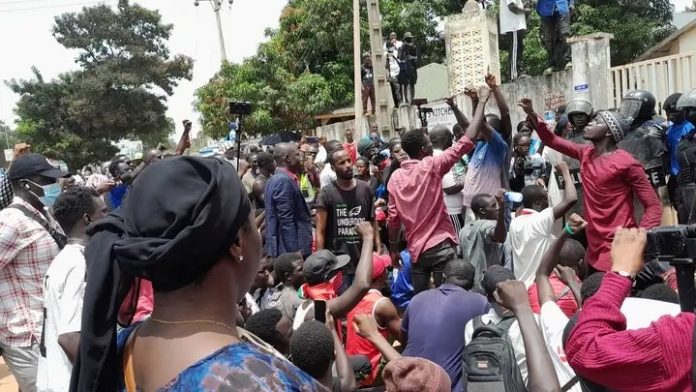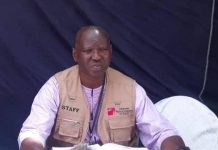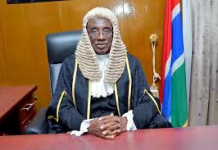By Nelson Manneh
Twenty-one individuals were arrested by The Gambia Police Force on Monday, August 25, 2025, after obstructing officers tasked with transporting remanded protesters to Mile II Central Prisons, as ordered by the Kanifing Magistrates’ Court.
The incident followed the court’s decision to remand twenty-three protesters, who had been charged with “Control of Procession” in violation of Section 5 (5) of the Public Order Act. The group had staged a peaceful demonstration on August 22nd at the Public Utilities Regulatory Authority (PURA) headquarters on Kairaba Avenue, protesting recent announcements regarding internet rates.
Principal Magistrate Thomas Touray presided over the proceedings, during which the charge sheet was read and interpreted for all accused in languages they understood. All pleaded not guilty and were subsequently ordered to be remanded at Mile II Central Prisons.
Following the court’s decision to remand the accused, a crowd assembled outside the court gates, demanding the unconditional release of the protesters. The gathering escalated as some demonstrators blocked the gate and others marched toward Mile II, vowing solidarity with the detainees.
“We are ready to go to jail with them. We started the protest together, and we will end it together,” chanted the crowd as tensions mounted.
The standoff turned violent when police deployed teargas to disperse protesters, who retaliated by throwing stones and sticks. The confrontation ended with the arrest and detention of twenty-one individuals for obstructing law enforcement efforts.
Police opened bail for the arrested protesters on August 23rd, but while three individuals were released after applying for police bail, the remaining detainees declined, insisting on unconditional bail and remained in custody. Foroyaa has yet to confirm if those newly arrested have since been granted bail.
A statement from the Police Public Relations Officer urged citizens to respect the rule of law and avoid actions that threaten public order and security.
The case draws attention to ongoing tensions between authorities and civil society over the right to peaceful assembly and the state’s response to public protest in The Gambia.




















